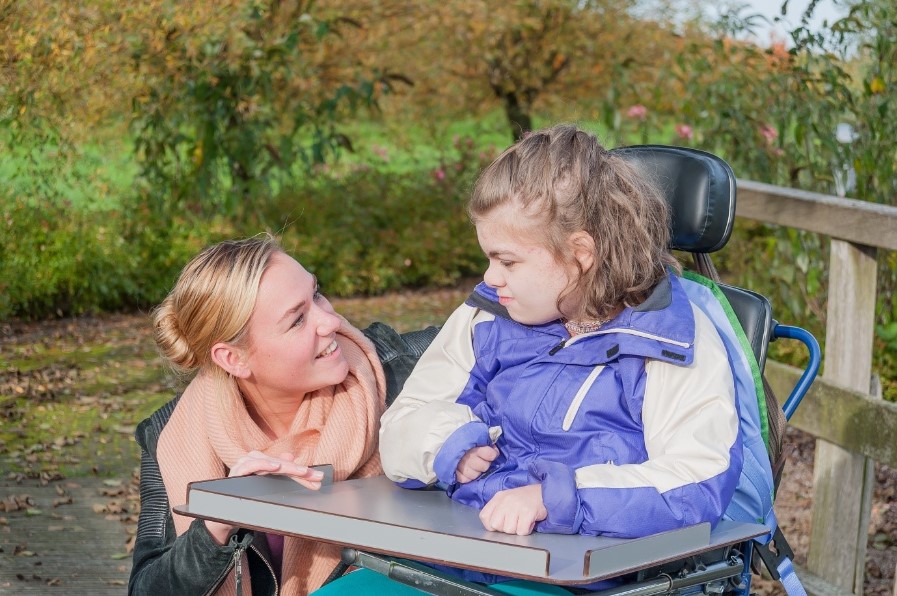The Complete Guide to Early Childhood Early Intervention (ECEI) and the NDIS
If you have a child with disability, early intervention can support them to grow and develop to their
full potential. Our guide explains the important things you need to know about the NDIS early childhood
approach, including how it works for children with disability or developmental delay, and the
benefits of getting started with support as early as possible.
What is Early Childhood Early Intervention??
Early intervention involves providing supports as soon as possible for a child with disability or developmental delay. It is also sometimes known as early childhood intervention or simply early intervention. The NDIS uses the term ‘early childhood approach’ to describe the services they fund to support a child’s development. Early intervention support aims to help children with disability and their families achieve the best outcomes. The early childhood approach recognises that the early years are a crucial time in a child’s development. Their brains and bodies are rapidly changing and are very responsive to the environment around them. Early intervention supports tap into this responsiveness to encourage healthy growth and development, and to help your child set up strong pathways for learning, emotional and social development.How the Early Childhood
Approach Works
The NDIS early childhood approach provides fast access to early intervention support services for children younger than seven years who have a disability, developmental delay, or developmental concerns. Under this approach, your child can access tailored support without needing to become an NDIS participant.
The early childhood approach is based on evidence about the types of supports that will help children with developmental concerns build skills in key areas, such as communication, movement, behaviour, and social skills. Building these skills helps your child gain independence with everyday activities and prepares them to participate in education settings.
The NDIS early childhood approach recognises the vital role parents and carers play in supporting a child’s development. Early supports focus on building the capacity of the child and their family, and working closely with families to make sure supports meet their needs.
What kind of supports are funded through ECEI?
Under the NDIS early childhood approach, supports fall into two categories:
1. Early connections
This program helps you and your child find support for their development. For example, it can assist you to:
- get contacts for mainstream supports in your local area, such as community health services, playgroups or parent support groups
- find helpful information related to your child’s development
- connect with other families
- request NDIS access
2. Early supports
Early supports are strategies and therapies that help your child build new skills to encourage their independence in everyday environments and their ability to participate in their families and communities. For example, allied health supports can assist children to build skills for everyday activities such as eating, walking, toileting, and dressing.
What are the benefits of early intervention?
Early intervention aims to support children aged younger than seven with a disability or developmental delay to have the best possible start in life. In some cases, it might mean these children do not need longer term support.
Here are some examples of how early intervention can benefit children with developmental concerns and their families.
Physiotherapy can help a child:
- reach developmental milestones such as sitting, crawling, and walking
- build strength, balance and co-ordination to help them participate in daily activities
- develop sports-specific skills so they can participate socially and be active
- address challenges with motor development, such as difficulty keeping up with peers
Occupational therapy can help a child:
- manage sensory processing difficulties so they can better engage in everyday environments
- develop skills for everyday activities such as dressing and going to the toilet
- build the fine motor skills needed for early childhood education, such as the ability to hold a pencil
Speech and language therapy can:
- support development of communication and language
- improve social communication skills
- help with mealtime issues such as swallowing difficulties
Dietetic therapy can help with:
- food allergies and intolerance
- reaching and staying at a healthy weight
- mealtime challenges such as fussy or picky eating
- failure to thrive (also known as growth faltering, slow growth, or poor growth)
Other benefits of early intervention can include:
- improved behaviour and emotional regulation
- setting patterns that support learning and academic achievement
- building exercise habits and eating patterns that support lifelong wellbeing
- improved ability to participate in family and community life
- better sleep hygiene and routines
- stronger family relationships
- greater ability to socialise with peers
- better confidence, self-image and resilience
Where is this service available?
The NDIS early childhood approach is in place across Australia and is designed to be consistent in each state and territory.
Who can access ECEI support?
You may be able to access early intervention support through the NDIS early childhood approach If your child is younger than seven and you have concerns about their development. For example, you might have concerns about your child’s:
- movement and play
- communication skills
- ability to care for themselves
- ability to socialise with other children.
A good place to start is talking with a professional who knows your child, such as your child’s doctor, child health nurse, early childhood educator, or an allied health professional.
If they agree there are signs of developmental concerns, they can help you connect with an early childhood partner to find the right supports.
Early intervention under the NDIS can help your child build new skills and gain independence.
Can I use the service if my child hasn’t been
diagnosed with a disability?
Yes. If your child is younger than seven, they do not need to have a formal diagnosis of disability from a medical professional to access early intervention services and support.
Once your child turns seven, they may be eligible to become an NDIS participant. An NDIS early childhood partner or local area coordinator can help you work out the best way for your child to continue getting support after they turn seven.
Children younger than 7 do not need a diagnosis to access early intervention.
What is an early childhood partner and how do I find one?
Early childhood partners are local organisations the NDIS funds to deliver the early childhood approach. An early childhood partner has access to teams of professionals with expertise and experience working with children with disability or developmental delay, and their families.
These professionals use a best practice, family-centred approach to deliver early intervention supports tailored to your needs, goals and circumstances.
There are currently no early childhood partners in remote or very remote areas. If you live somewhere that does not have an early childhood partner and are concerned about your child’s development, first talk to a health or education professional in your local area. Someone from the NDIA can work with you directly to arrange early intervention supports.
Early intervention with Active Ability
If your child has a disability, you want high quality support to help them reach their goals. At Active Ability, our NDIS registered
physiotherapists and dietitians focus on supporting children who have an intellectual disability, autism, mental health condition or neurological disorder.
Our team can visit you in your preferred environment, whether that’s at home, school or a convenient local facility.
At Active Ability, we do not have a waiting list and do not charge for travel. This means you can start therapy right away and get great value from your NDIS funding.
To learn more about how we might be able to support your child and family, get in touch with our friendly team on (02) 9161 5887,
hello@activeability.com.au or via our contact form.
Get in touch
hidden
Follow Us



